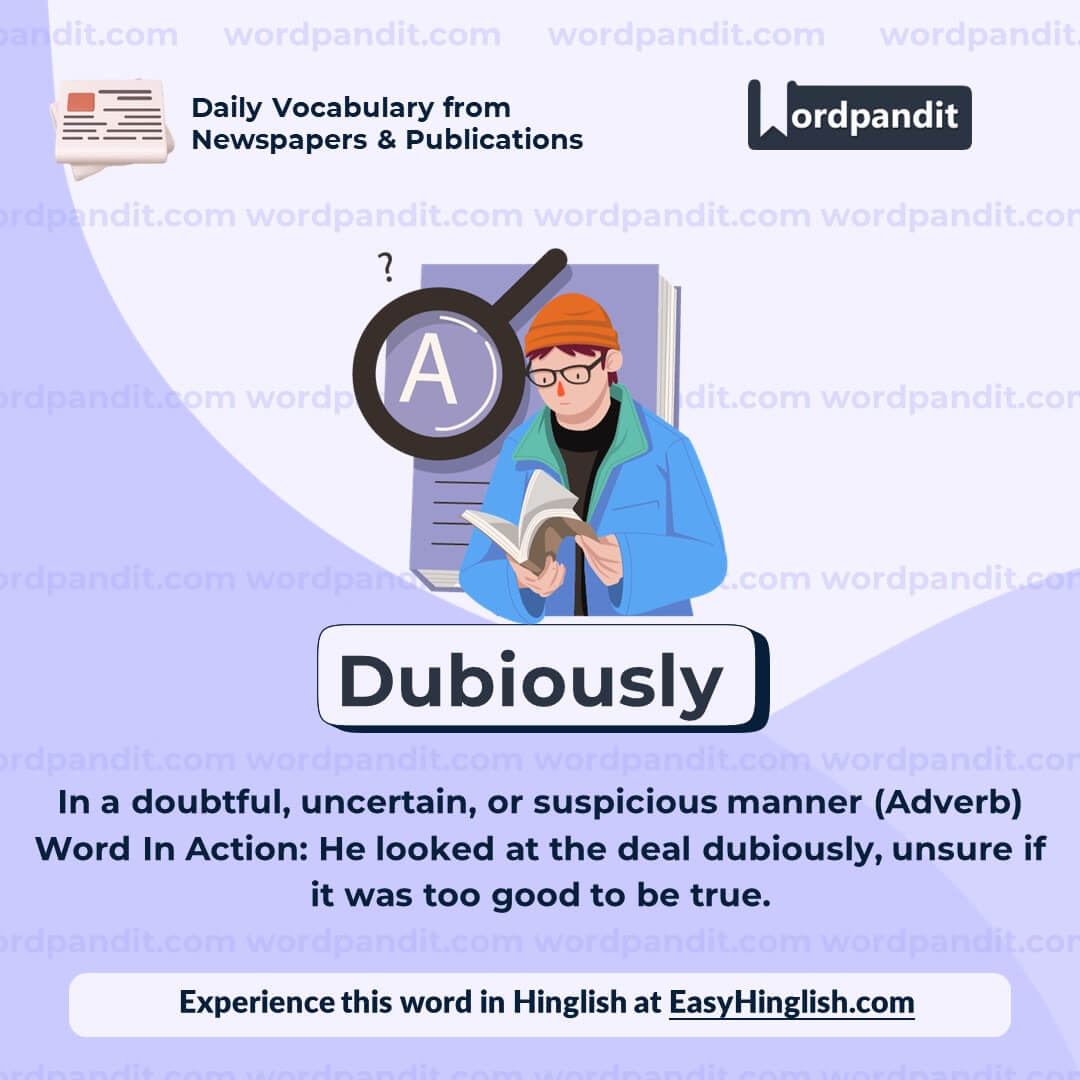Daily Vocabulary from International Newspapers and Publications
Expand Your Vocabulary with Wordpandit’s Global Vocabulary Hub
At Wordpandit, we are committed to helping you develop a truly global vocabulary by drawing from some of the most respected international publications. This section is designed to keep you ahead of the curve by introducing you to words that define global conversations and trends.
The Power of Global Sources
To help you think and communicate on a global scale, we curate vocabulary from renowned international sources, such as:
- The New York Times
- The Washington Post
- BBC
- The Guardian
- The Economist
- Scientific American
- Psychology Today
- And many more...
Stay Global, Stay Competitive
Our daily updates from international publications ensure you are consistently exposed to new words that reflect global news and developments, making sure your vocabulary is not only current but also globally relevant.
Enhance Your Global Perspective
Whether you’re preparing for international exams, aiming to excel in global business communication, or want to enhance your language skills for personal growth, Wordpandit offers the resources you need to thrive in a global context.
Effective Learning, Global Reach
Our learning methodology combines global examples, memory aids, and interactive activities, allowing you to internalize new words effectively and apply them in real-world scenarios.
Begin Your Global Vocabulary Journey Now!
Why Choose Wordpandit?
Practical Learning: Focus on words you'll actually encounter in real-world reading, enhancing your comprehension and communication skills.
Diverse Content: From current affairs to scientific breakthroughs, our varied sources expose you to vocabulary across multiple domains.
Effortless Integration: Make Wordpandit a part of your daily routine. Just a few minutes each day can significantly boost your lexicon over time.
Your Path to Vocabulary Mastery
- Visit our Daily Vocabulary section regularly
- Explore new words and their usage in context
- Practice incorporating these words into your own writing and speech
- Track your progress as your vocabulary expands
Start Your Journey Today
Embark on your vocabulary enhancement journey with Wordpandit. By consistently engaging with our daily posts, you'll build a robust vocabulary that serves you well in academic, professional, and personal contexts.
Remember, a word a day keeps linguistic limitations at bay. Make Wordpandit your daily companion in the quest for vocabulary excellence!
WORD-1: Contagious
Context:
"Yawning can be contagious." - Aeon
Explanatory Paragraph:
The word "contagious" describes something that spreads easily from one person to another. It is often used to refer to diseases that pass through direct or indirect contact, but it can also describe emotions, behaviors, or reactions that spread quickly, such as laughter or enthusiasm. In the given context, the statement suggests that seeing someone yawn can trigger others to yawn as well, a phenomenon known as contagious yawning.
Meaning: Capable of spreading from one person to another (Adjective)
Pronunciation: kuhn-TAY-jus
Difficulty Level: ⭐⭐ (Beginner to Intermediate)
Etymology: From Latin *contagiosus*, derived from *contagium* ("contact, infection"), which comes from *contingere* ("to touch"). Originally used for diseases, its meaning expanded to emotions and behaviors.
Synonyms & Antonyms:
Synonyms: Infectious, transmissible, spreading, communicable
Antonyms: Non-contagious, contained, limited, isolated
Usage Examples:
- His laughter was so contagious that soon the entire room was laughing.
- The flu is highly contagious, so doctors recommend frequent handwashing.
- Her enthusiasm for the project was contagious, inspiring the whole team to work harder.
- Yawning is a contagious reflex that scientists believe is linked to empathy.
Cultural Reference:
"The phrase 'contagious enthusiasm' is often used to describe a leader or speaker whose energy spreads to their audience, motivating them to take action." - Leadership Insights Journal
Think About It:
Besides yawning, what other emotions or behaviors do you think are contagious? Why do people tend to mimic each other?
Quick Activity:
Observe a group of people and see if you notice any contagious behaviors, like smiling or laughing. Write a short paragraph describing what you observed.
Memory Tip:
Think of "contagious" as something that "contacts" others—whether it’s a virus, a yawn, or even a good mood, it spreads through interaction!
Real-World Application:
"Contagious" is frequently used in healthcare, psychology, and social interactions. Understanding how emotions and behaviors spread can be useful in leadership, marketing, and communication.
WORD-2: Regaled
Context:
"Regaled with champagne and Marmite sandwiches, the audience had no idea that they were about to be read the riot act." - Aeon
Explanatory Paragraph:
The word "regaled" means to entertain, delight, or lavishly provide someone with food, drink, or amusement. In the given context, the audience was being treated to champagne and sandwiches, likely enjoying themselves, unaware of what was about to follow. This word is often used when someone is generously or extravagantly entertained.
Meaning: To entertain or lavishly supply with food and drink (Verb)
Pronunciation: ri-GAYLD
Difficulty Level: ⭐⭐⭐ (Intermediate)
Etymology: From Old French *regaler*, meaning "to entertain or feast," which originally stemmed from *gale*, meaning "merriment or pleasure."
Synonyms & Antonyms:
Synonyms: Entertained, delighted, feasted, amused, pampered
Antonyms: Bored, neglected, deprived
Usage Examples:
- The host regaled his guests with a sumptuous feast and fine wine.
- She regaled us with hilarious stories from her travels across Europe.
- As children, we were often regaled with bedtime tales of knights and dragons.
- The cruise ship regaled its passengers with gourmet meals and live performances.
Cultural Reference:
"Regaling an audience with captivating storytelling has been an essential skill of great orators, from Shakespearean actors to modern-day TED speakers." - Public Speaking Journal
Think About It:
What is the most memorable way you have been regaled, whether with food, stories, or entertainment?
Quick Activity:
Write a short paragraph using "regaled" to describe a lavish dinner party or an exciting story someone told you.
Memory Tip:
Think of "regal" (meaning royal) – when someone is "regaled," they are treated like royalty, with plenty of food, stories, or entertainment!
Real-World Application:
The word "regaled" is often used in hospitality, travel, and storytelling contexts. It appears in event descriptions, restaurant reviews, and even historical accounts of lavish feasts.
WORD-3: Abrogate
Context:
"Citizens voted to abrogate the antiquated law." - Aeon
Explanatory Paragraph:
The word "abrogate" means to officially repeal, abolish, or do away with a law, rule, or agreement. It is often used in legal and political contexts when referring to the formal cancellation of policies or regulations. In the given context, citizens voted to eliminate an outdated law, likely because it was no longer relevant or justifiable.
Meaning: To officially end or repeal a law, agreement, or custom (Verb)
Pronunciation: AB-ruh-gate
Difficulty Level: ⭐⭐⭐⭐ (Advanced)
Etymology: From Latin *abrogare*, meaning "to repeal or annul a law," formed from *ab-* ("away") and *rogare* ("to propose a law").
Synonyms & Antonyms:
Synonyms: Repeal, revoke, annul, abolish, nullify
Antonyms: Enact, establish, uphold, ratify
Usage Examples:
- The Supreme Court has the power to abrogate laws that violate the constitution.
- The new government pledged to abrogate outdated regulations that hindered economic growth.
- The treaty was abrogated after both countries failed to comply with its terms.
- The company decided to abrogate its agreement with the supplier due to repeated contract violations.
Cultural Reference:
"Throughout history, societies have abrogated oppressive laws, such as the abolition of slavery and the repeal of segregation laws." - Political Science Journal
Think About It:
Can you think of a law or rule that you believe should be abrogated? Why do you think it is outdated or unnecessary?
Quick Activity:
Write a short paragraph using "abrogate" in the context of politics, business, or social change.
Memory Tip:
Think of "abrogate" as "a broken gate"—when a law or rule is abrogated, it is broken down and removed, just like an old gate that is no longer needed.
Real-World Application:
The word "abrogate" is commonly used in legal, political, and corporate settings. It is a useful term for discussing policy changes, constitutional amendments, and the repeal of outdated laws.
WORD-4: Asceticism
Context:
"Ascetics often practice to become closer to their concept of divinity through the purification of their soul." - Aeon
Explanatory Paragraph:
Asceticism is a lifestyle characterized by self-discipline and the avoidance of indulgence, often for spiritual or philosophical reasons. Many religious traditions encourage ascetic practices such as fasting, meditation, and renouncing material possessions to attain higher wisdom or closeness to the divine. It is rooted in the belief that by minimizing physical desires, one can achieve greater spiritual enlightenment.
Meaning: Severe self-discipline and avoidance of all forms of indulgence, typically for religious reasons (Noun)
Pronunciation: uh-SET-uh-siz-uhm
Difficulty Level: ⭐⭐⭐ Intermediate
Etymology: Derived from the Greek word "askēsis," meaning "exercise" or "training," originally referring to physical and later to spiritual discipline.
Synonyms & Antonyms:
Synonyms: Self-denial, austerity, self-discipline, abstinence, frugality
Antonyms: Indulgence, luxury, hedonism, extravagance
Usage Examples:
- Many Buddhist monks follow a path of asceticism, renouncing material possessions and worldly desires.
- His asceticism was evident in his simple lifestyle, devoid of modern comforts or luxuries.
- The philosophy of asceticism teaches that true happiness lies in self-restraint and inner peace rather than external pleasures.
- During Lent, some Christians adopt temporary asceticism by fasting or giving up certain luxuries as an act of devotion.
Cultural Reference:
"Gandhi’s personal lifestyle reflected a deep commitment to asceticism, as he believed in simple living and high thinking." - Historical Accounts
Think About It:
Can asceticism lead to true happiness, or does it unnecessarily deprive individuals of life's pleasures?
Quick Activity:
List three modern examples of ascetic practices and explain how they help individuals achieve personal or spiritual growth.
Memory Tip:
Think of "asceticism" as "A Set of Self-Control"—a disciplined way of life that avoids excess.
Real-World Application:
Asceticism is often practiced by individuals seeking mental clarity, spiritual enlightenment, or self-improvement, such as those following minimalist lifestyles, monks, and yoga practitioners.
WORD-5: Dubiously
Context:
"And he told of brilliant scientific minds who might know a lot about the second law but were barely up to the task of reading Charles Dickens, let alone an 'esoteric, tangled and dubiously rewarding writer...like Rainer Maria Rilke.'" - Aeon
Explanatory Paragraph:
The word "dubiously" comes from the adjective "dubious," meaning doubtful or uncertain. When something is described as "dubiously rewarding," it suggests that its value or benefit is questionable. In the given context, the writer implies that reading Rainer Maria Rilke may not be worth the effort, as the rewards of understanding his work are uncertain or possibly unimpressive.
Meaning: In a doubtful, uncertain, or suspicious manner (Adverb)
Pronunciation: DOO-bee-us-lee
Difficulty Level: ⭐⭐⭐ (Intermediate)
Etymology: Derived from Latin *dubiosus*, meaning "doubtful," which comes from *dubium*, meaning "doubt." It evolved into the English *dubious*, with "dubiously" as its adverbial form.
Synonyms & Antonyms:
Synonyms: Doubtfully, suspiciously, hesitantly, uncertainly, questionably
Antonyms: Confidently, surely, unquestionably, certainly
Usage Examples:
- She looked at the expired milk dubiously before deciding to throw it away.
- The salesman made a dubiously generous offer that seemed too good to be true.
- He accepted the invitation dubiously, unsure of what to expect.
- The politician’s promise of immediate economic recovery was received dubiously by the public.
Cultural Reference:
"In detective novels, suspects often glance dubiously at the investigator when questioned about their alibi, signaling their potential guilt or nervousness." - Mystery Writing Handbook
Think About It:
Can you recall a time when you reacted dubiously to something? What made you feel uncertain or skeptical?
Quick Activity:
Write a short dialogue where one character reacts dubiously to another’s claim or promise.
Memory Tip:
Think of "dubiously" as "do you believe this?"—when something is dubious, you're unsure if you can believe it!
Real-World Application:
"Dubiously" is often used in journalism, business, and everyday conversations to describe skepticism or doubt, making it a useful word for critical thinking and analysis.



















